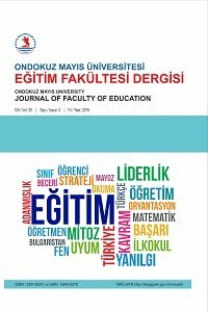THE EFFECT OF COGNITIVE AND COMPENSATION STRATEGY INSTRUCTION ON READING COMPREHENSION SKILL
BİLİŞSEL VE TELAFİ EDİCİ STRATEJİ EĞİTİMİNİN OKUDUĞUNU ANLAMA BECERİSİ ÜZERİNDEKİ ETKİSİ
___
- BLASS Lauire, FRIESEN Hanah and BLOCK Kathy (2008). Creating Meaning, Hong Kong: Oxford University Press.
- BEDİR Hasan (1998). The Effects of Using Cognitive Learning Strategies on Reading Comprehension Ability of Turkish Students, Unpublished Doctoral Dissertation. Çukurova University, Graduate School of Social Sciences, Adana.
- CARRELL P. L. and EISTERHOLD J. C. (1983). ,Schema theory and ESL reading pedagogy', TESOL Quarterly. 17(4), 553-573.
- ÇUBUKÇU Feryal (2008). ,How to Enhance Reading Comprehension through Metacognitive Strategies', Uluslararası Soysal Araştırmalar Dergisi, Volume 1/2 Winter, p. 83-93.
- DUBIN F. and BYCINA D. (1991). ,Academic reading and the ESL/EFL teacher', in M. Celce-Murcia (Ed.), Teaching English As A Second Or Foreign Language,New York: Newbury House, p. 195-209.
- ELLIS Rod (1994). The Study of Second Language Acquisition, Oxford: Oxford University Press.
- GRENFELL Michael and MACARO Ernesto (2007). Claims and Critiques, in Cohen, and Ernesto Macaro (eds.), Language Learner Strategies,Oxford: Oxford University Press, p. 11.
- GRIFFITHS Carol (2004). ,Language Learning Strategies: Theory and Research', Research Paper Series, 1.Centre for Research in International Education.22.02.2011. (Available)http://www.crie.org.nz
- HEDGE Tricia (2000). Teaching and Learning in the Language Classroom, Oxford: Oxford University Press.
- KIROĞLU M. Kasım (2002). ,Anlamlı Ögrenme Stratejilerinin İngilizce Okudugunu Anlamaya Etkisi', Ondukuz Mayıs University Journal of Education, 14, 6-12.
- MUHTAR Sema (2006). Üstbilişsel Strateji Eğitiminin Okuma Becerisinde Öğrenci Başarısına Olan Etkisi. Unpublished M.A. Thesis. Ankara University,Graduate School of Social Sciences, Ankara.
- O'MALLEY J. Micheal et. al.(1985). ,Learning Strategies Used by Beginning and Intermediate ESL Students', Language Learning, 35/1, 21-46.
- O'MALLEY J. Michael (1987). ,The Effects of Training in the Use of Learning Strategies on Learning English as a Second Language', in Anita Wenden & Joan Rubin (eds) Learner Strategies in Language Learning. Cambridge: Prentice Hall, p. 133-143.
- OXFORD Rebecca L. (1990). Language Learning Strategies, New York: Newbury House Publishers.
- RIVERS Wilga M. (1981).Teaching Foreign Language Skills, London: The University of Chicago Press.
- RUBIN Joan (1975). ,What the 'Good Language Learner' Can Teach Us', TESOL Quarterly, 9, p. 41-51.
- RUBIN Joan (1987). ,Learner Strategies: Theoretical Assumptions, Research History and Typology', in Wenden, Anita and Joan Rubin (eds). Learner Strategies in Language Learning,Cambridge: Prentice Hall, p. 15.
- STEINAGEL Lane O. (2005). The Effects of Reading and Reading Strategy Training on Lower Proficiency Level Second Language Learners, Brigham Young University, Unpublished Doctoral Dissertation. Brigham.
- STERN H.H. (1975). ,What Can We Learn from the Good Language Learner?', Canadian Modern Language Review, 31, 304-18.
- STERN H.H. (1992). Issues and Options in Language Teaching, Oxford: Oxford University Press.
- TANG Hui Nee and Dennis W. Moore (1992). ,Effects of Cognitive and Metacognitive Pre-reading Activities on the Reading Comprehension of ESL Learners',EducationalPsychology, 12/3&4, p. 315-331
- ISSN: 1300-302X
- Yayın Aralığı: 2
- Başlangıç: 1986
- Yayıncı: Ondokuz Mayıs Üniversitesi Eğitim Fakültesi
ÖĞRETMENLERİN, OKULLARINA İLİŞKİN ÖRGÜTSEL İMAJ ALGILARININ BAZI DEĞİŞKENLER AÇISINDAN İNCELENMESİ
Celal Teyyar UĞURLU, Neslihan CEYLAN
ÖĞRETMEN MEMNUNİYET DÜZEYLERİ VE HAYAL ETTİKLERİ EĞİTİM ORTAMI
Özlem ÖZÇAKIR SÜMEN, Kaya Tuncer ÇAĞLAYAN
FEN VE TEKNOLOJİ DERSLERİNDE GAZETELERİN KULLANILMASI
Esma BULUŞ KIRIKKAYA, Esra BOZKURT, Şebnem İŞERİ
THE EFFECT OF COGNITIVE AND COMPENSATION STRATEGY INSTRUCTION ON READING COMPREHENSION SKILL
Dilek ÇAKICI, Okt İsmail YAMAN
MÜZİK ÖĞRETMENLİĞİ LİSANS ALAN DERSLERİNDE KLASİK GİTARIN YERİ VE ÖNEMİ
Bilişsel ve Telafi Edici Strateji Eğitiminin Okuduğunu Anlama Becerisi Üzerindeki Etkisi
